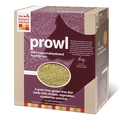
Cat Food
Veterinarian Reviewed on June 15, 2012 by Dr. Janice Huntingford
Cat Food
Cat food is specifically formulated in order to provide the precise nutritional requirements that are needed by cats. Whilst cats are obligate carnivores, a majority of commercial cat food contains both animal and plant material, which is supplemented with vitamins, minerals, and nutrients.
A majority of store bought cat food is either in the form of dry food, which is known as kibble, or wet food which comes in a can. There are manufacturers who do sell frozen raw diets and premixed products to cater for owners who feed their cats a raw diet instead.
Dry Food
Dry food, which contains 8-10% moisture, is typically prepared by extrusion cooking under high heat and pressure. In order to increase the taste, fat may be sprayed onto the food, and other ingredients may be added such as heat-sensitive vitamins, which would ultimately be destroyed in the extrusion process.
Major brand-name cat food manufacturers often use grain-based ingredients with added animal protein by-products or animal digest in order to cut their manufacturing and production costs. Higher end foods, which are offered as ‘premium’, ‘natural’, or ‘holistic’ formulas, contain less or no grain, and have a higher percentage of animal protein as well.
Wet Food
Canned or wet food, which has 75-78% moisture, typically comes in cans of 3 oz, 5.5 oz, and 13 oz. It is also sold by some manufacturers in single serve foil pouches.
It is thought that wet food, in comparison to dry food, can help to treat or noticeably reduce the likelihood of numerous health issues such as Cat Lower Urinary Tract Disease, Cat Diabetes, chronic renal failure, constipation, and even obesity.
Prescription Food
Prescription foods are available from your veterinarian’s office or online pet pharmacies for specific diseases such as Cat Lower Urinary Tract Disease and chronic renal failure. However, it is vital to remember that most prescription diets have no clinical studies behind them to support their use in the treatment of these various diseases.
Homemade Food
Many cats are fed a homemade diet by their owners. These diets typically consist of some form of cooked or raw meat and vegetables. Additional taurine supplements and other multivitamin supplements should also be offered in the homemade meal as well.
Vegetarian or Vegan Food
For many years, vegetarian or vegan food has been available for our feline friends. Many cat owners believe that a vegetarian diet is healthier than a conventional, store bought diet.
As obligate carnivores, our feline friends require nutrients found in meat sources that simply cannot be obtained sufficiently in plant sources. Vegetarian pet food companies attempt to rectify these deficiencies by over-supplementing their products with synthetically produced nutrients.
Whilst there is evidence that cats do well on a vegetarian diet, it has been shown through recent studies that commercial and homemade vegetarian cat foods have an inadequate amount of nutrients. Even when vegetarian food is adequately supplemented, the diet may present other risks, such as urine acidity problems. There are a few vegetarian cat food brands that are labeled by their manufacturers as meeting the Cat Food Nutrient Profile, whilst other manufacturers recommend that their products are supplemented and not used alone.
Dehydrated Food
One of the best types of cat food varieties today, many cat owners prefer to feed their cats a dehydrated food, instead of a conventional dry kibble. The majority of this type of cat food comes in protective packaging. A little bit of water is all that is needed to re-hydrate the food. Dehydrated food can fed as is or mixed in with other food to provide your cat with a well-balanced meal.
Regardless of what type of food cat owners wish to feed their feline friends, the most important thing is that they enjoy what they are eating whilst at the same time receiving the correct amount of vitamins and nutrients.
Sign up for our newsletter and receive more articles and the latest pet health updates and special offers.
Our Expert
 Dr. Janice Huntingford
Dr. Janice HuntingfordJanice Huntingford, DVM, has been in veterinary practice for over 30 years and has founded two veterinary clinics since receiving her Doctor of Veterinary Medicine at the Ontario Veterinary College, University of Guelph. She has studied extensively in both conventional and holistic modalities. Ask Dr. Jan

